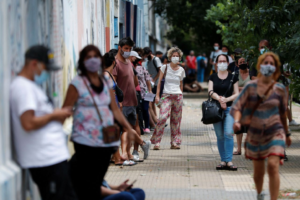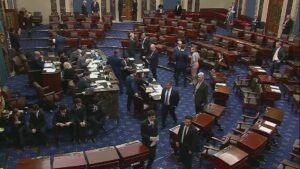The UN refugee agency revealed that the number of people fleeing war and persecution was more than 79 million last year — the highest such figure since the agency was founded 70 years ago.
Euronews spoke to the UN High Commissioner for Refugees, Filippo Grandi, who explained what was driving such high figures.
“It is essentially conflicts that push most of these millions of people out of their homes. So these new conflicts emerging, and old conflicts there have been there for decades sometimes, like in Afghanistan or Somalia, tend to continue without solution”.
The vast majority of people who fled their homes last year were escaping conflicts or economic crises. Sixty-eight per cent of them came from just five countries: Syria, Venezuela, Afghanistan, South Sudan and Myanmar. Forty per cent of them were children.
COVID-19 has only exacerbated the situation — forcing already struggling economies to come to a halt. Grandi said this has affected the most vulnerable.
“Most of these people depend on daily wages, on fragile incomes, on the informal economy. All of this disappears in lockdowns which is a necessary measure taken by governments to stop the pandemic. But the loss of livelihoods has been devastating”.SPONSORED CONTENTFrance wants to make hurting the planet illegal, but what is ecocide?Ad by euronews
But when it comes to helping asylum seekers Grandi believes Europe can improve by forming a common EU migration policy.
“This crisis has revealed that Europe, once again, is not able to deal with these population movements. Because the only way to deal with them is to be united, to share the burden, to share the responsibility, when a boat arrives, to immediately have a system in place that distributes the asylum seekers through the continent… Once again we have observed boats floating in the Mediterranean, difficult negotiations lasting many days inflicting a lot of hardship (on migrants) and fueling political rhetoric of those that are exploiting this situation”.




